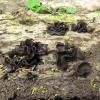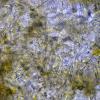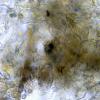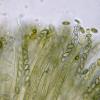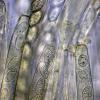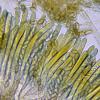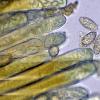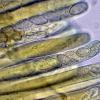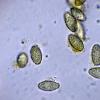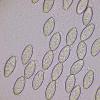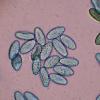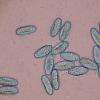
28-02-2026 14:43
A new refrence desired :Svanidze, T.V. (1984) Novy

01-03-2026 18:46
 Robin Isaksson
Robin Isaksson
Hi! This species i se from time to time in the

27-02-2026 17:51
 Michel Hairaud
Michel Hairaud
Bonjour, Quelqu'un peut il me donner un conseil p

27-02-2026 16:17
 Mathias Hass
Mathias Hass
Hi, Found this on Betula, rather fresh fallen twi

01-03-2026 18:02
 Francois Guay
Francois Guay
I found this mystery Helotiales on an incubated le

01-03-2026 14:10
 Antonio Couceiro
Antonio Couceiro
Hola, me gustaria conocer opiniones sobre este tem
¿Pachyella?
Josep Torres,
22-05-2025 08:55
A Pezizal sprouting scattered in small groups on the peeled surface of a trunk lying on the ground in a fluvial forest next to a stream, with specimens deformed by pressure between them.
Ascomata of considerable size, some exceeding 4 cm, brown with faint violet hues, not exuding any latex upon contact or injury, and of fragile consistency.
Hyphae of the medullary exciple are filamentous, with an intricate texture and some very evident swellings.
Beneath these, other hyphae are more globose and larger.
Octosporic asci with only a slight, very diffuse amyloid reaction to Melzer.
Ellipsoidal ascospores decorated with obvious warts, very visible in Cresyl Blue, with spore measurements obtained by natural sporulation and in water of:
(19.3) 19.9 - 22.5 (23.8) × (9.8) 10.1 - 11.1 (11.4) µm
Q = (1.7) 1.9 - 2.2 (2.3) ; N = 40
Me = 21.2 × 10.6 µm ; Qe = 2
If for any reason you need more images, just ask.
Considering its lignicolous habitat and the diffuse amyloid reaction of the asci to Melzer, I think of Pachyella, but without any conviction. It's even possible that I had studied this species before, but I can't remember and I'm completely stuck. Any feedback from you will be appreciated.
Thank you very much in advance.
Best regards.
Marek Capoun,
22-05-2025 17:04

Re : ¿Pachyella?
Hello, Josep,
I would probably look in the genus Phylloscypha.
Marek
I would probably look in the genus Phylloscypha.
Marek
Nicolas VAN VOOREN,
22-05-2025 17:22

Re : ¿Pachyella?
Marek is right.
Josep Torres,
23-05-2025 07:44
Re : ¿Pachyella?
Thank you both very much.
Of course, Phylloscypha, and most likely Phylloscypha phyllogena. I rightly mentioned in my post that I didn't rule out having studied it before. I've studied Phylloscypha phyllogena on a couple of occasions, and in both cases, it grew in the soil. In addition to the more pronounced amyloid reaction of its asci, the fact that it appeared directly on the wood confused me greatly. Based on this fact alone, I ruled it out from the start.
Best regards.
Of course, Phylloscypha, and most likely Phylloscypha phyllogena. I rightly mentioned in my post that I didn't rule out having studied it before. I've studied Phylloscypha phyllogena on a couple of occasions, and in both cases, it grew in the soil. In addition to the more pronounced amyloid reaction of its asci, the fact that it appeared directly on the wood confused me greatly. Based on this fact alone, I ruled it out from the start.
Best regards.

